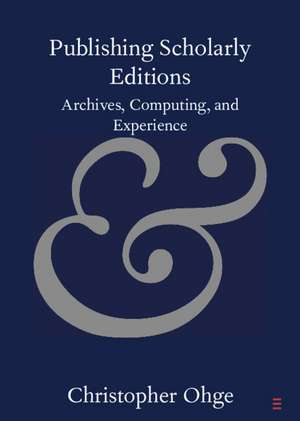Publishing Scholarly Editions: Archives, Computing, and Experience: Elements in Publishing and Book Culture
Autor Christopher Ohgeen Limba Engleză Paperback – dec 2021
Din seria Elements in Publishing and Book Culture
-
 Preț: 95.21 lei
Preț: 95.21 lei -
 Preț: 95.17 lei
Preț: 95.17 lei -
 Preț: 94.98 lei
Preț: 94.98 lei -
 Preț: 95.21 lei
Preț: 95.21 lei -
 Preț: 95.21 lei
Preț: 95.21 lei -
 Preț: 95.21 lei
Preț: 95.21 lei -
 Preț: 95.12 lei
Preț: 95.12 lei -
 Preț: 95.17 lei
Preț: 95.17 lei -
 Preț: 95.31 lei
Preț: 95.31 lei -
 Preț: 95.12 lei
Preț: 95.12 lei -
 Preț: 95.12 lei
Preț: 95.12 lei -
 Preț: 95.17 lei
Preț: 95.17 lei -
 Preț: 95.17 lei
Preț: 95.17 lei -
 Preț: 95.17 lei
Preț: 95.17 lei -
 Preț: 95.31 lei
Preț: 95.31 lei -
 Preț: 117.08 lei
Preț: 117.08 lei -
 Preț: 117.62 lei
Preț: 117.62 lei -
 Preț: 117.08 lei
Preț: 117.08 lei -
 Preț: 118.43 lei
Preț: 118.43 lei -
 Preț: 130.13 lei
Preț: 130.13 lei -
 Preț: 117.08 lei
Preț: 117.08 lei -
 Preț: 116.31 lei
Preț: 116.31 lei -
 Preț: 116.70 lei
Preț: 116.70 lei -
 Preț: 117.08 lei
Preț: 117.08 lei -
 Preț: 116.48 lei
Preț: 116.48 lei -
 Preț: 117.08 lei
Preț: 117.08 lei -
 Preț: 116.48 lei
Preț: 116.48 lei -
 Preț: 116.31 lei
Preț: 116.31 lei -
 Preț: 130.89 lei
Preț: 130.89 lei -
 Preț: 116.31 lei
Preț: 116.31 lei -
 Preț: 118.22 lei
Preț: 118.22 lei -
 Preț: 116.85 lei
Preț: 116.85 lei -
 Preț: 117.46 lei
Preț: 117.46 lei -
 Preț: 117.46 lei
Preț: 117.46 lei -
 Preț: 117.08 lei
Preț: 117.08 lei -
 Preț: 117.46 lei
Preț: 117.46 lei -
 Preț: 117.46 lei
Preț: 117.46 lei -
 Preț: 95.17 lei
Preț: 95.17 lei -
 Preț: 116.31 lei
Preț: 116.31 lei -
 Preț: 116.09 lei
Preț: 116.09 lei -
 Preț: 117.84 lei
Preț: 117.84 lei -
 Preț: 117.24 lei
Preț: 117.24 lei -
 Preț: 94.98 lei
Preț: 94.98 lei -
 Preț: 116.09 lei
Preț: 116.09 lei -
 Preț: 117.62 lei
Preț: 117.62 lei -
 Preț: 116.85 lei
Preț: 116.85 lei -
 Preț: 116.85 lei
Preț: 116.85 lei -
 Preț: 130.35 lei
Preț: 130.35 lei -
 Preț: 116.70 lei
Preț: 116.70 lei -
 Preț: 117.08 lei
Preț: 117.08 lei
Preț: 118.43 lei
Nou
Puncte Express: 178
Preț estimativ în valută:
22.66€ • 23.41$ • 18.86£
22.66€ • 23.41$ • 18.86£
Carte tipărită la comandă
Livrare economică 25 martie-08 aprilie
Preluare comenzi: 021 569.72.76
Specificații
ISBN-13: 9781108720182
ISBN-10: 1108720188
Pagini: 75
Dimensiuni: 125 x 178 x 7 mm
Greutate: 0.13 kg
Editura: Cambridge University Press
Colecția Cambridge University Press
Seria Elements in Publishing and Book Culture
Locul publicării:Cambridge, United Kingdom
ISBN-10: 1108720188
Pagini: 75
Dimensiuni: 125 x 178 x 7 mm
Greutate: 0.13 kg
Editura: Cambridge University Press
Colecția Cambridge University Press
Seria Elements in Publishing and Book Culture
Locul publicării:Cambridge, United Kingdom
Cuprins
Introduction; 1. The Author; 2. The Data; 3. The Edition; Conclusion.
Recenzii
'In Publishing Scholarly Editions, Christopher Ohge cogently argues for approaching editing in pragmatic terms, explicitly invoking the ideas of William James and John Dewey. Such an approach emphasizes the complexities of writerly acts, publishing exigencies, and readerly interpretations and charts the networks of actions and practices that constitute literary experience. Through a lucid contribution to editorial theory and deftly articulated case studies, Ohge shows the opportunities that scholarly editing and especially digital editing provide for displaying these complexities and networks and opening up, rather than closing down, meaning.' Samuel Otter, Professor and Slusser Chair in English at the University of California and author of Melville's Anatomies
'Ohge foregrounds minimal computing as one way to navigate the dilemma pitting editing against publishing. But his objective in this engaging and thought-provoking book - one necessary for our juncture in time - is to raise questions more than to offer answers (certainly not easy ones). Indeed, the last chapter raises a question that is critical to the future of scholarly editing: 'What, then, is the meaning and function of the publisher in the digital age?' (116). In reality, this question is essential to the future of humanistic scholarship generally, and Ohge's probing exploration of it is one of the most important dimensions of his book.' Geoffrey Turnovsky, Textual Cultures
'Ohge foregrounds minimal computing as one way to navigate the dilemma pitting editing against publishing. But his objective in this engaging and thought-provoking book - one necessary for our juncture in time - is to raise questions more than to offer answers (certainly not easy ones). Indeed, the last chapter raises a question that is critical to the future of scholarly editing: 'What, then, is the meaning and function of the publisher in the digital age?' (116). In reality, this question is essential to the future of humanistic scholarship generally, and Ohge's probing exploration of it is one of the most important dimensions of his book.' Geoffrey Turnovsky, Textual Cultures
Descriere
This Element argues that editing is computational, and that such 'computations' enable new methods of publishing, reading, and experiences.
